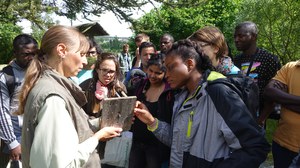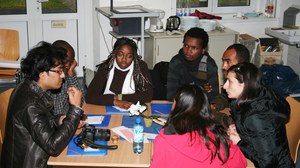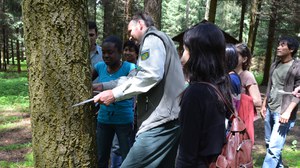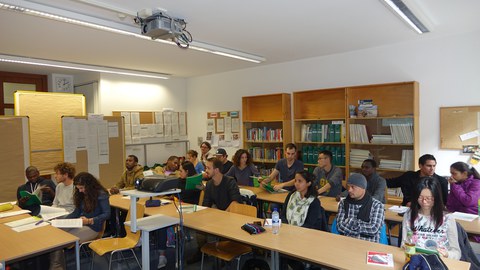Teaching at the Chair of Tropical and International Forestry
Lectures are hold for bachelor and master courses in Forest Science.
The Chair of Tropical and International Forestry offers a master degree in Tropical Forestry. The specialization focuses on the influence of key actors and institutions on forest outcomes around the globe.
It especially provides insights into the multi-level and multi-sector system governing forests internationally and nationally. It addresses types of actors and institutions in global and regional multi-lateralism, as well as at national, sub-national and local landscape scales. In terms of content, the specialization equips students with theoretical as well as practical knowledge of key institutions and actors in global forestry. This includes international organisations, iNGOs, transnational organisations as well as the full set of public and private actors in national forest governance settings, including their interests and power capabilities of formal and informal nature.
The specialization further introduces the multi-level and multi-sector aspects of global forests, including claims from e.g. agribusiness, mining, logging, biodiversity protection, local and tribal groups, infrastructure, and investors at different scales. It enables students to identify resulting forest-related conflicts at multiple scales, the underlying interests of key actors, as well as to develop communication strategies and tools for addressing them with the different competing actors. Elective options provide the students with the opportunity to complement the specialization with their personal preferences.
 © TUD/Tropen
© TUD/Tropen
Studieren an der Professur für Tropische Forstwirtschaft
Der Studiengang wurde 2008 durch die Agentur ASIIN akkreditiert, eine externe Evaluation durch den DAAD erfolgte 2009 mit sehr gutem Ergebnis und 2010 erfolgte die Reakkreditierung ohne Auflagen.
Ziel des Studiums ist die Ausbildung von kompetenten Führungskräften mit der Befähigung, wissenschaftlich fundierte, innovative und nachhaltigkeitsorientierte Bewirtschaftungskonzepte für Wald, Forstplantagen und Gehölzkomponenten in agroforstlichen Systemen sowie urbanen und peri-urbanen Grünräumen zu entwickeln, ihre Umsetzung zu steuern und beobachtend zu begleiten. Das schließt die flexible Anpassung an die sich verändernden ökologischen und gesellschaftlichen Rahmenbedingungen ein. Die Studierenden erwerben Wissen zu Methoden aus Sozial-, Natur- und Technikwissenschaft und können dies im Management tropischer und subtropischer Landschaftsräume anwenden. Der Schwerpunkt liegt auf der Interaktion zwischen Mensch und Wald sowie zwischen unterschiedlichen Interessengruppen, was in der Vermittlung multi-disziplinärer Verfahrensweisen Ausdruck findet.
Die Absolventen werden vom Arbeitsmarkt kurzfristig absorbiert, laut Alumnibefragung 2013 62 % innerhalb von sechs Monaten. Ihre Karrierechancen verbessern sich durch das Studium wesentlich. Dies kommt in der raschen Entwicklung bezüglich Position und beruflicher Weiterqualifizierung zum Ausdruck. Das betrifft in zunehmendem Umfang weibliche Studierende. Die große Zahl von PhD-Studenten, die international aus den bisherigen Studiengängen Tropische Waldwirtschaft und Tropical Forestry and Management rekrutiert wurde, zeigt zudem den problemlosen Übergang zum Doktorandenstudium weltweit.
Mit der deutlichen Fokussierung auf Kompetenzen im Bereich Management wird der berufsfeldbezogenen Nachfrage entsprochen. Aufgrund der Verschärfung von Problemen globaler Naturressourcennutzung um die Erhaltung biologischer Diversität und des Klimawandels wird eine weiterhin steigende Nachfrage nach Absolventen des Studienganges prognostiziert. Dies betrifft insbesondere auch Absolventen aus europäischen Ländern. Die Ergebnisse einer DAAD-Umfrage zeigen, dass ca. 50% der Absolventen des Master-Studiums unmittelbar im mittleren Management und über 10% im Top-Management beschäftigt sind. Für dieses Merkmal nimmt der Studiengang eine Spitzenposition im untersuchten Kollektiv ein.





